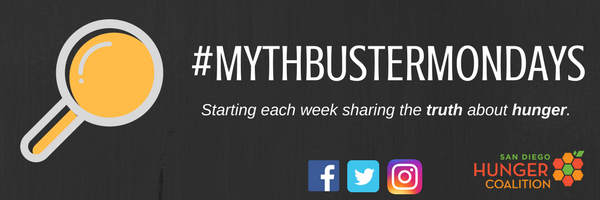#MythbusterMonday - January 2018 Myths Busted!
/We begin each week using our online voice to debunk myths about hunger. Our #MythbusterMonday social media series dispels misinformation and stigma commonly associated with food assistance programs like CalFresh/SNAP and youth meals and the people who rely on them to help put food on the table.
What hunger myths have you heard? Join us in sharing the truth about hunger each Monday using the hashtag #MythbusterMonday.
In January, we busted the following hunger myths:
January 1
The first Monday of the month we take a look back at the myths busted the previous month. Check out the myths we busted in December 2017. Click here.
January 8
#MythbusterMonday “Senior hunger is only a problem for poor people.” False! Senior hunger is not just an income issue. It is also a problem of access and care. Many seniors who can afford it, lack the mobility to get and prepare their own meals and don’t have other support systems to help them. Those same seniors and others live in areas that are more difficult to access. Click here to read more myths about senior hunger from HuffPost.
January 16
#MythbusterMonday "Hunger in the U.S. is only found in poor urban neighborhoods." False! Hunger is also found in rural America. According to Feeding America, "People who live in rural areas often face hunger at higher rates, in part because of the unique challenges living remotely presents. These challenges include an increased likelihood of food deserts with the nearest food pantry or food bank potentially hours away, job opportunities that are more concentrated in low-wage industries and higher rates of unemployment and underemployment." Click here to learn more.
January 22
#MythbusterMonday - "With programs like Breakfast in the Classroom, kids will eat twice or too much." False! A 2015 study by health professionals published in the Journal of the Academy of Nutrition and Dietetics concluded that breakfast in the classroom was not associated with an increase in calorie intake at breakfast time or throughout the day. If anything it led to more kids getting breakfast. Click here to read more from No Kid Hungry.
January 29
#MythbusterMonday "The U.S. is the richest country, so we have less hunger." False! According to a 2014 guest column by Tracie McMillan in The Chautauquan Daily there are about 49 million Americans who say they run out of food at least once a year (1 in 6) — putting the U.S. at the bottom of the pack when it comes to our country's economic peers. In many European countries, the ratio of hungry to fed is one in 20.










